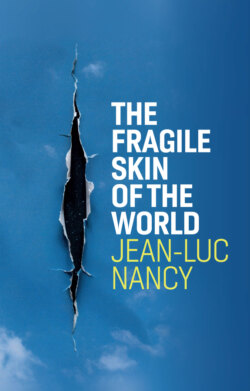Читать книгу The Fragile Skin of the World - Jean-Luc Nancy - Страница 10
3
ОглавлениеHistory never repeats. But the newness of a tremor or of a rupture entails at the very least a formal analogy to an eclipse and a shock (perhaps each time a brief exposition to ‘the fixed featureless splendour’). What I’m here calling ‘formal’ is in truth of the order of affect, upheaval, trauma. We are in the register of birth and death, bedazzlement and blinding, appearing and disappearing – a register that has no history, but rather drives history. In this sense there is no past or tradition to revive without tradition itself being subverted.
We often believed ourselves capable of taking up other traditions – those of the Russian world, the Islamic world, or the world of the Orient – but each time, the access to other sources was hindered by, and indeed got tangled up within, the irrepressible contagion of the Occident. The entire world has sought to (or has had to) modernize – even as Western modernity came to doubt itself. Even Japan’s very successful equilibrium between tradition and modernity seems now to be tilting in an irreversible way towards a Western situation.
Nothing seems more striking to me than this: the West is called into question and calls itself into question in all possible ways and from all possible angles (capitalism, progress, technics, democracy, atheism, enjoyment, domination, etc.). This broad designation of ‘the West’ – so broad that it has largely been deterritorialized across the surface of the earth and even beyond – continues to be primarily identified with certain territories. Europe is of course the first, even if it is flanked by its enormous American outgrowth. This term is not an error: there was indeed, long ago, a tremor in the West, the first extension of which was Mediterranean. One should not imagine this tremor as having initiated a destiny, or a teleology of whatever nature one might imagine. But there is no doubt that it initiated a sequence that contained within it, in its genetic ingeniousness, a distinctive feature: the mastery of time. Where other civilizations envelop time in a permanence, this civilization sought to master succession. A culture of duration – and then of progression – is different in nature from a culture of permanence. When a Roman poet – Horace – declares that he has edified a monument more durable than bronze, one should understand these words as stressing the edification and the elaboration of the work. Workings are what count in the work; the enterprise prevails in the monument.
The enterprise: this term can be seen as emblematic of an important, if not essential, trait of the West. This trait makes its full-fledged appearance in Rome. Rome has all the traits of an enterprise: it bestows upon itself a project that is its own production, as well as its export or its extension. It manages this project steadily across an entire set of conjoined registers: an original city that forms itself as an autarchy, such that it in fact becomes a sort of civil religion, unknown even to the Greeks, and an identity that is more moral (based on virtue) than territorial or familial; the elaboration of the first system of law conceived as a complete edifice in continuous construction; the development, unprecedented in its quasi-systematicity, of a set of techniques (urban, military, agricultural, mechanical), many of which will take centuries to be discovered; finally, an expansion that is equally unprecedented, since it destroys few other cities (Carthage above all) but incorporates a great number of them, allowing them to subsist in the shadow of its force and its law. It is Rome that invents the model of empire in a sense that Europe will often seek to take up: the autocratic domination of a diverse set of popular, cultural, and religious unities.
Rome doesn’t only revive the Athenian concept of autonomy: it entirely detaches it from local and popular identity, and opens it to an enterprise that for the first time merits, on its own scale, the name ‘globalization’. (One could add, if one wanted to spend some time on this point, a comparison with the Chinese Empire, which, broadly speaking, in roughly the same period, unified a great expanse of territory according to a completely different dynamic, which one could refer to as a hoarding rather than an enterprise.)
As we know, Rome collapsed. It is not by chance that Europe has kept alive the memory of this fall, which at the time seemed astonishing. Rome collapsed beneath its own weight: beneath the weight of its own incapacity to locate the sense of its enterprise. As we know, torment and dread (both philosophical and religious) were already stirring, starting two centuries before the Common Era. When Constantine sought to revive the Empire by devoting it to Christianity, it was already too late.
